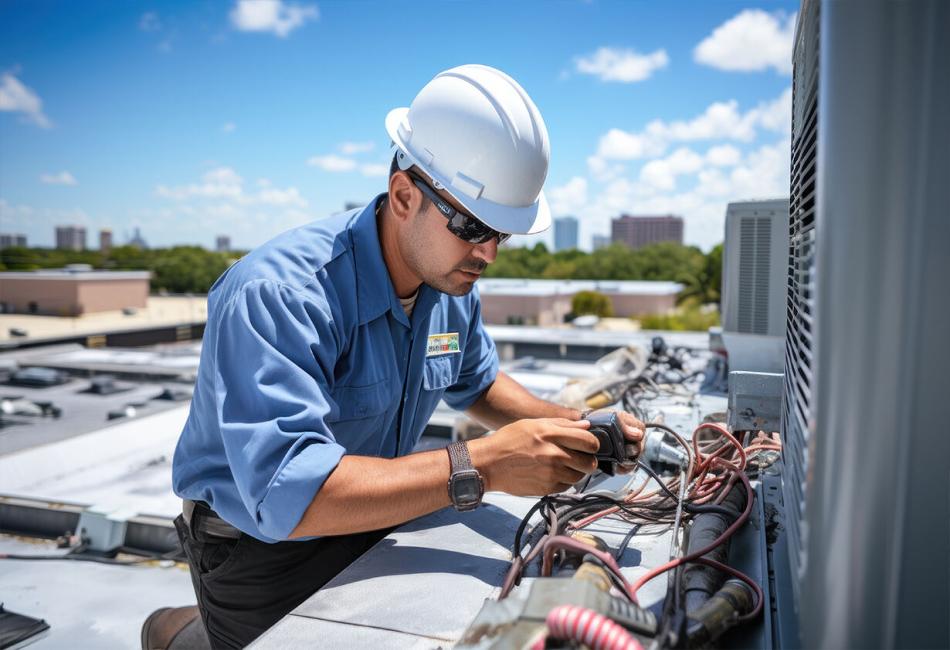When you’re running a business, there’s nothing more important than keeping your employees and customers comfortable. That’s where commercial HVAC installation comes into play. Whether you’re opening a new office, expanding your retail space, or upgrading an outdated system, getting your heating, ventilation, and air conditioning right isn’t just about comfort—it’s about productivity, energy costs, and your bottom line.
But here’s the thing: commercial HVAC systems aren’t like the unit in your home. They’re complex beasts that require serious expertise to install properly. Make the wrong choice, and you could be looking at sky-high energy bills, frequent breakdowns, and unhappy occupants for years to come.
Understanding Commercial HVAC Systems
Commercial HVAC systems are designed to handle much larger spaces and more demanding requirements than residential units. Think about it—your business might have dozens of employees, heavy equipment generating heat, varying occupancy levels throughout the day, and specific humidity requirements depending on your industry.
These systems typically include multiple components working together: rooftop units, ductwork, thermostats, air handlers, and sometimes specialized equipment like heat recovery ventilators or energy management systems. The complexity means that proper installation isn’t just recommended—it’s absolutely critical for the system to function as designed.
What makes commercial installation particularly challenging is that every building is different. A restaurant has completely different needs than an office building or a manufacturing facility. Your installer needs to understand not just HVAC systems, but also your specific business requirements, local building codes, and energy efficiency standards.
Key Factors to Consider Before Installation
Before any equipment gets installed, there’s serious planning that needs to happen. First, you’ll need a thorough load calculation. This isn’t just about square footage—it’s about understanding heat gain from windows, insulation levels, occupancy patterns, equipment heat loads, and even factors like ceiling height and building orientation.
Energy efficiency should be at the top of your priority list. Modern commercial HVAC systems can be incredibly efficient, but only if they’re properly sized and installed. An oversized system will cycle on and off frequently, wasting energy and failing to properly dehumidify. An undersized system will run constantly, struggling to maintain comfortable temperatures while driving up your utility bills.
Don’t forget about future needs either. Are you planning to expand your business? Will you be adding equipment that generates heat? A good commercial HVAC installation takes growth into account, ensuring your system can adapt as your business evolves.
The Installation Process: What to Expect
Professional commercial HVAC installation typically happens in several phases. First comes the design and engineering phase, where experts create detailed plans showing exactly where equipment will be placed, how ductwork will be routed, and how the system will integrate with your building’s existing infrastructure.
Next comes the preparation work. This might involve structural modifications to support heavy rooftop equipment, electrical work to provide proper power supply, and coordination with other trades if you’re doing a complete renovation. This phase requires careful scheduling to minimize disruption to your business operations.
The actual equipment installation requires specialized tools and expertise. Commercial units are much larger and heavier than residential equipment, often requiring cranes or other heavy machinery to position properly. Ductwork installation in commercial buildings is particularly complex, as it needs to work around existing utilities, meet fire safety codes, and provide proper airflow to all zones.
Choosing the Right Installation Partner
This is where many business owners make costly mistakes. Not all HVAC contractors are equipped to handle commercial projects. You need a team with specific commercial experience, proper licensing, and the resources to handle large-scale installations.
Look for contractors who can provide detailed references from similar commercial projects. Ask about their experience with your type of business—installing HVAC in a medical office requires different expertise than setting up a system in a warehouse or retail store.
Professional installation companies like those at Air & Plumbing Systems Inc understand that commercial projects have unique requirements. They should be able to handle everything from initial design and permitting through final commissioning and testing. More importantly, they should offer comprehensive maintenance programs to keep your system running efficiently for years to come.
Long-term Benefits of Professional Installation
When commercial HVAC installation is done right, the benefits extend far beyond just comfortable temperatures. Properly installed systems operate more efficiently, reducing your monthly energy costs significantly. They also tend to have fewer breakdowns, meaning less disruption to your business and lower repair costs over time.
There’s also the comfort and productivity factor. Studies consistently show that employees are more productive in comfortable environments. Your customers will notice too—nobody wants to shop in a stuffy store or dine in an uncomfortably warm restaurant.
Professional installation also ensures your system meets all local building codes and efficiency standards. This protects you from potential fines and ensures you’re eligible for any available rebates or tax incentives for energy-efficient equipment.
Remember, your commercial HVAC system is a major investment that will serve your business for 15-20 years or more. Getting the installation right from the start isn’t just smart business—it’s essential for long-term success. Take the time to work with experienced professionals who understand commercial systems, and you’ll enjoy reliable, efficient climate control that supports your business goals for decades to come.

